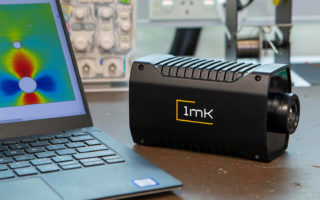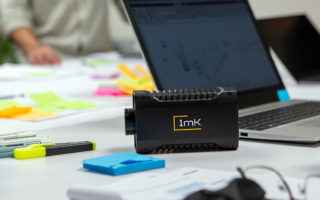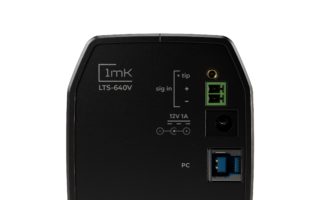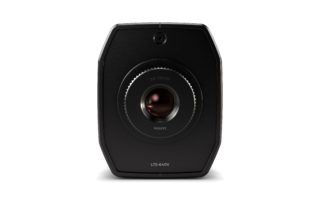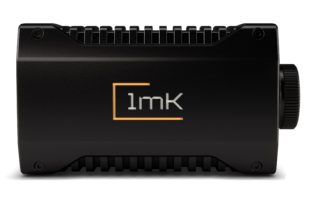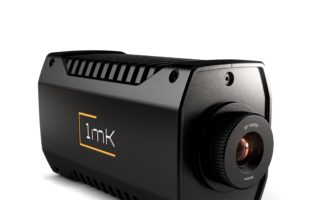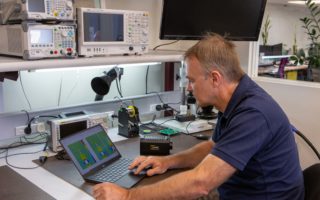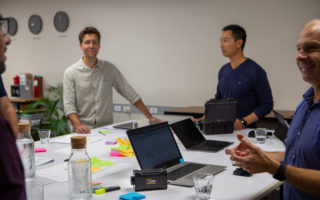Australian-made game changer for stress testing and failure monitoring of structures
An Australian innovation with significant pedigree, and global safety implications, is rapidly moving towards commercial reality thanks in part to a co-funded grant from the Federal Government’s Advanced Manufacturing Growth Centre (AMGC).
1MILLIKELVIN’s technology can identify and measure minute changes in temperature in solid objects which are a direct result of the structural loads (compression and tension) applied to it. For example, it can image complex aircraft structures undergoing fatigue testing, and generate highly accurate and detailed full field stress maps. The system achieves this via small infrared cameras and sophisticated real-time image and data processing to capture high-resolution close-up images of the object and identify critical stress hot spots.
Referred to as MiTE (Microbolometer Thermoelastic Evaluation), the device has been developed under the stewardship of 1MILLIKELVIN and the Department of Defence – the same department responsible for inventing the revolutionary black box flight recorder. With such lineage, MiTE has the potential to reinvent the way engineers and scientists measure the integrity of structures with significant implications for safety and productivity.
“As a former salesman for a multinational infrared imaging specialist, I had been aware for some time of this transformative technology under development at Defence – our biggest customer at the time,” explains Kheang Khauv, Managing Director at 1MILLIKELVIN, a start-up spun off from LRM Technologies.
“After we formed LRM we jumped at the chance to bring MiTE to market. We started collaborating with Defence and our other partners to further develop prototypes for defence, aerospace and commercial application. With this grant, we will now be able to accelerate commercialisation and manufacture MiTE for global defence, aerospace and commercial applications,” said Khauv.
Besides being portable and capable of in-situ monitoring, the solution address a wider market need for smaller, cost effective thermoelastic stress measurement offerings due to economies of scale and miniturisation. As a result, the device is expected to be priced between one-fifth and one-tenth of its competitors. Potential uses of the mini-cam are vast with it being successfully utilised in analysing stress points in a Lockheed Martin F-35.
Khauv cites it could potentially analyse the structural health of a vast array of structures – from rollercoasters to civil infrastructure – as possibilities, allowing for real-time visual insights without the use of thousands of strain gauges and hours of setting these up per test.
“The MiTE is a prime example of what can be achieved when industry and research collaborate. And in this case, the device joins a long list of defence-derived innovations which have transformed everything from surgery to communications and navigation,” says Dr Jens Goennemann, Managing Director, AMGC.
“Of course, invention is not the same as innovation – this requires a team effort to turn R&D into a commercial outcomes. We are thrilled to support this project, not only with funding, but in providing those invaluable linkages between industry and research oganisations to support bringing this revolutionary product to market.” Said Goennemann.
Through the AMGC co-funded grant, 1MILLIKELVIN and its partners will develop a mini-format version of 1MILLIKELVIN’s camera and move the product from Technology Readiness Level (TRL) 3 to 7 resulting in advanced prototypes ready for in-situ testing and certification with defence customers or researchers.
Khauv says that collaboration had been the missing ingredient in commercialisation. As impressive as the technology was, it was not something that they could bring to customers on their own.
“Previously to resolve temperature changes of even 20 millikelvin required a big, bulky defence- or scientific-grade machine costing close to a $1 million, which only a scientist could operate. This system is much simpler to use, is able to resolve a temperature change of less than 1 millikelvin and could in later stages be deployed in civilian settings,” he explains.
“Without collaboration we would only ever have a great idea and get nothing done, commercially speaking. Our journey has required us making countless contacts, continuing algorithm and software development work with Defence, partnership with Outerspace for industrial design, and university help for validation.” Said Khauv.
The Advanced Manufacturing Growth Centre is supporting the commercialisation of this revolutionary, home-grown invention through a $149,800 co-funded grant. The total project funds will be further boosted by matched industry funding and a further $175,000 in kind contribution.
Upon completion of the project, 1MILLIKELVIN estimate total revenues of $8 million a year by 2025 and the creation of over 11 highly skilled local jobs.
For further information on the 1MILLIKELVIN and the MiTE project visit: https://www.amgc.org.au/project/miniature-thermoelastic-stress-analysis-camera/

